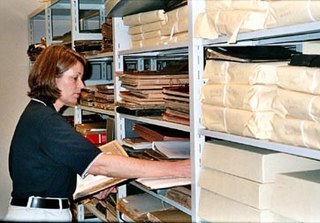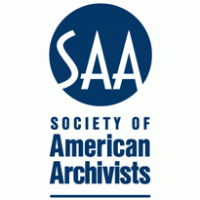
An archivist is an information professional who assesses, collects, organizes, preserves, maintains control over, and provides access to records and archives determined to have long-term value. The records maintained by an archivist can consist of a variety of forms, including letters, diaries, logs, other personal documents, government documents, sound and/or picture recordings, digital files, or other physical objects.

The Society of American Archivists is the oldest and largest archivist association in North America, serving the educational and informational needs of more than 5,000 individual archivist and institutional members. Established in 1936, the organization serves upwards of 6,200 individual and member institutions.
Encoded Archival Description (EAD) is a standard for encoding descriptive information regarding archival records.
Archival processing is the act of surveying, arranging, describing, and performing basic preservation activities on the recorded material of an individual, family, or organization after they are permanently transferred to an archive. A person engaging in this activity is known as an archival processor, archival technician, or archivist.
In archival science and archive administration, appraisal is a process usually conducted by members of the record-holding institution in which a body of records is examined to determine its value for that institution. It also involves determining how long this value will last. The activity is one of the central tasks of an archivist, to determine the archival value of specific records. When it occurs prior to acquisition, the appraisal process involves assessing records for inclusion in the archives. In connection with an institution's collecting policy, appraisal "represents a doorway into the archives through which all records must pass". Some considerations when conducting appraisal include how to meet the record-granting body's organizational needs, how to uphold requirements of organizational accountability, and how to meet the expectations of the record-using community.
Trustworthy Repositories Audit & Certification (TRAC) is a document describing the metrics of an OAIS-compliant digital repository that developed from work done by the OCLC/RLG Programs and National Archives and Records Administration (NARA) task force initiative.

Robert Sidney Martin is an American librarian, archivist, administrator, and educator. He is Professor Emeritus, School of Library and Information Studies, Texas Woman’s University, where he was the Lillian M. Bradshaw Endowed Chair until his retirement in 2008.
Digital curation is the selection, preservation, maintenance, collection, and archiving of digital assets. Digital curation establishes, maintains, and adds value to repositories of digital data for present and future use. This is often accomplished by archivists, librarians, scientists, historians, and scholars. Enterprises are starting to use digital curation to improve the quality of information and data within their operational and strategic processes. Successful digital curation will mitigate digital obsolescence, keeping the information accessible to users indefinitely. Digital curation includes digital asset management, data curation, digital preservation, and electronic records management.

Archival research is a type of research which involves seeking out and extracting evidence from archival records. These records may be held either in collecting institutions, such as libraries and museums, or in the custody of the organization that originally generated or accumulated them, or in that of a successor body. Archival research can be contrasted with (1) secondary research, which involves identifying and consulting secondary sources relating to the topic of enquiry; and (2) with other types of primary research and empirical investigation such as fieldwork and experiment.

The UNC School of Information and Library Science(SILS) is a professional school at the University of North Carolina at Chapel Hill offering a bachelor's degree in information science, master's degrees in library science and information science, a professional science master's degree in digital curation, and a doctoral degree in information and library science as well as an undergraduate minor, graduate certificate programs, and a post-masters certificate.
Elizabeth Yakel is an archivist, researcher, and educator in information science. Yakel is known for work advancing archival practice, the use of primary sources in archives education, studies of data reuse practices, and digital curation. Yakel is the senior associate dean for academic affairs and a professor at the University of Michigan School of Information, where she has been on the faculty since 2000. She is the former coordinator of the Preservation of Information specialization in the Master of Science in Information program and teaches in the Archives and Record Management area. She specializes in digital archives and digital preservation and has developed five such graduate level courses at UM, including "Economics of Sustainable Digital Information" and "Practical Engagement Workshop in Digital Preservation."
Dr. Nancy Y. McGovern is a digital preservation pioneer. She is the 2023 recipient of the Emmet Leahy Award for Outstanding Contributions to the Information and Records Management professions. Dr. McGovern has devoted her career to developing digital records and preservation programs for a series of prominent institutions, translating those experiences into widely-used curriculum and continuing education programs to help organizations and individuals build their capacity to develop sustainable programs to preserve digital content, defining and promulgating standards-based good practice for digital archives and preservation, and engaging in research-based practice to fill gaps in good practice for digital archives and the preservation of them. She has focused on building an international community of practice for digital archives and preservation most recently with the development and promulgation of the Radical Collaboration model for working within and across domains.

Elizabeth "Betty" Edwards Hamer Kegan was an American archivist and librarian, and served as the Assistant Librarian of Congress from 1963 to 1978. She was a founding member of the Society of American Archivists (SAA) in 1936 and was President of SAA from 1975-1976.

Susan Grey Akers was an American librarian and the first woman to hold an academic deanship at the University of North Carolina.

Helen Wong Smith is an American archivist and librarian. She is the archivist and librarian for University Records at the University of Hawaiʻi at Mānoa. She works in the University Archives and Manuscripts Collection of the Public Services Division. She is formerly an Archivist and Librarian for the State Historic Preservation Division as well as the Executive Director of the Kauaʻi Historical Society. Smith is an active member of the Society of American Archivists, becoming President in 2023, and having served in many leadership roles including on the Council, the Committee on Education, and the Nominating Committee from 2012-2014. Smith was named an SAA Fellow on June 10, 2016.
Tanya Zanish-Belcher is an archivist and associate professor. She is currently the Director of Special Collections and Archives at the Z. Smith Reynolds Library at Wake Forest University in Winston-Salem, North Carolina. She specializes in Women's, Gender and Sexuality Studies and has written several books and articles as well as given presentations on these topics. She has been invited to speak on several occasions as an expert historian and archivist across the United States.
Anne Jervois Gilliland is an archivist, scholar, and professor in the field of archival studies. She is Associate Dean for Information Studies at the University of California, Los Angeles Graduate School of Education & Information Studies.

Julie White Walker is an American librarian and currently the state librarian of Georgia. She earned her bachelor’s degree in political science from the University of North Carolina at Chapel Hill. In 1982, she earned her master’s in library science from the same university.
The Protocols for Native American Archival Materials (PNAAM) is a set of best professional practices around the care and use of American Indian archival materials that are held in non-tribal libraries, archives, museums, and other cultural institutions.
Ricardo L. Punzalan is a Filipino American archivist who is an Associate Professor of Information at the University of Michigan School of Information. He has shaped the fields of archival science, virtual reunification, repatriation, reparative description, and has studied the nature of collections in both museums and archives. He holds undergraduate and Masters degrees from the University of the Philippines and a doctorate in information science from the University of Michigan.










